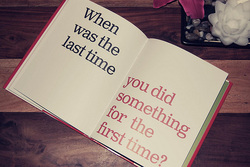 "When was the last time you did something for the first time?" I saw this idea come up yesterday in a few different ways, the above quote being one of them. So, I finally stopped to think about it. When would that have been? What was it I did? Did I enjoy it so much it blew my memory of all recollection or was it so horrible I have blanked it from my mind?! The best part about the question is that is can inspire you to do something small. When was the last time you tried a new recipe, tried on something in the store you thought looked hideous on the hanger, tried a new restaurant, ordered something different at your usual restaurant, attempted a new yoga pose, driven a new route to work...and so on. What could you do today for the first time? I am doing something totally new on Saturday for my first time. I will be officiating a wedding! I am thinking that may be hard to top on Sunday!!! But the beauty is that I don't have to top it; I just have to do something else for the first time! (This is assuming, of course, that my goal is one new thing per day, which may be a little much!) Sometimes the new things fall right into your path. The question is will you accept their challenges? “If you want something new, you have to stop doing something old.” - Peter F. Drucker “It is only when the mind is free from the old that it meets everything anew, and in that there is joy.” ― Jiddu Krishnamurti Follow this link to read an author's excerpt about the book she wrote about firsts: http://www.today.com/books/author-challenges-herself-do-something-new-every-day-i-dare-8C11523818
0 Comments
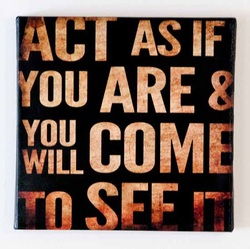 Tara Sophia Mohr sent out a blog recently about how scared she was to give birth. She wrote she was scared before she got pregnant and still scared after she became pregnant. She decided to go to a prenatal yoga class where the teacher asked her if she was having her first baby to which Tara replied yes. Quoting from the blog, the teacher responded: “I can’t believe that,” she said. “It just seems like you’ve done this a thousand times before,” she said. I was immediately blushing, and on cloud nine. And then I had the thought, “You can act as if that’s true.” And suddenly, then and there, I decided I had done labor a thousand times before. And the minute I thought that, I found a part of myself who had done it a thousand times before. It was like she raised her hand and said, “Here I am.” I really loved this. Awhile ago, I was telling someone, we will call her skeptic to keep her anonymity, to keep saying what you want to occur over and over in your mind and it will be what you attract to your life. She scoffed, that's ridiculous! Why would I say something like I am happy if I know I am not? The answer is simply because the mind believes what you tell it. Tara writes, "Act as if. Most of the time in life, we are in the process of becoming. We want to become more brave, or more forgiving, or more grateful or more confident or whatever it is. Instead of waiting to be that, we can simply try on the thought that we are that, and then act as if it were true. “I’ve done labor a thousand times” or “I’m totally qualified for this role” or “My artwork has an adoring fan base.” It’s not about being delusional, it’s about changing your behavior, upping your game, by giving yourself a new frame within which to operate." Tara Sophia Mohr I love where she says it is not about being delusional; it is not! It is about maybe considering you are all the things you think you only could be. Here's an example: if I have been telling myself for years that my thighs are fat (which we women are really good at thinking!), I am going to believe it. If I switch that thought to train my mind that my thighs look fabulous, I will eventually believe it and move on!!! And don't give me the argument that you may grow to believe your thighs are fabulous but everyone else will still be thinking they are fat.....Sonia Choquette says if you are worried about what other people think, mind your own business. And, seriously, if that is all someone else has to think about, they need to do some revaluating of their thoughts as well. So, in class today, we drew Oracle cards from two different decks. This is fun because it always proves that the Universe will help you choose the card you are supposed to have. The last time I had students draw two cards, we were all amazed how the cards (from 2 different decks) relayed the same message. So let's say you drew a compassion card and you are feeling anything but compassionate. Create a new mantra! I am compassionate. I am compassionate. And allow yourself to be. Act as if, Tara wrote. She said she immediately connected with the person inside of her who had given birth thousands of times before. Who says we disconnect from past life experiences? She probably has and that energy came to her when she needed it. Act as if you are comfortable in a room full of strangers. Act as if you are sexy, confident, responsible, powerful... even if you don't believe it right away, I am betting others will. They will feel your energy shift. Norman Vincent Peale: “If you want a quality, act as if you already have it. If you want to be courageous, act as if you were - and as you act and persevere in acting, so you tend to become.”  Essential oils are naturally distilled extractions found in flowers, seeds, bark, stems, roots, and other parts of plants. Essential oils have been used throughout history for a wide variety of reasons. - Egyptians used aromatic oils for medicinal purposes, beauty treatments, preparing food & ceremonies -Greeks used oils for therapeutic massage and aromatherapy -Romans- used oils to promote health and personal hygiene - Used throughout the dark ages in Europe for their anti-bacterial and fragrant properties Besides amazing health benefits, both physically and emotionally, essential oils create a vibration and balance in your energy centers. Like the petals of the ylang ylang flower, the chakras are depicted as having their own petals as well. Each chakra energy center correlates to a different number of petals. The root chakra, located at the very base of the spine, has two petals versus the crown chakra which is said to have 1000. The number of petals is based on the number of subtle energies, or nadis, that travel through the chakra. When the chakras or petals are open, we are more open to new experinces and awarenesses around us. The chakras also respond with vibration to mantra. Each petal is connected to one of the letters of the Sanskrit alphabet. When that sound is heard, it creates a vibration in that petal. Aum (Om) is the easiest mantra and is the universal sound for all sounds, therefore, it triggers balancing vibration in all chakras. The seed sounds, or bija sounds, for the seven main chakras are as follows; the first five are pronounced with an "ah" sounding "a".
Sufi poet Rumi wrote the following poem; see how it may correlate to your journey of chakra balancing and healing. THE GUEST HOUSE This being human is a guest house. Every morning a new arrival. A joy, a depression, a meanness, some momentary awareness comes as an unexpected visitor. Welcome and entertain them all! Even if they are a crowd of sorrows, who violently sweep your house empty of its furniture, still, treat each guest honorably. He may be clearing you out for some new delight. The dark thought, the shame, the malice. Meet them at the door laughing and invite them in. Be grateful for whatever comes. because each has been sent as a guide from beyond. ~ Jelaluddin Rumi (translated by Coleman Barks)  The rain is slashing angrily against my windows; the black has filled the sky like an octopus' ink in water. I hear the wind ravaging tree branches against the side of my house and I can't help wonder if my description is accurate or a result of my mind set. Could it be that the rain is dancing mightily upon my windows like Indian moccasins in time with a drum? Why is the black sky a bad thing when black is my favorite color? Could it be a reminding me to enjoy my favorite things? The wind has died down as I type this. A coincidence or is the wind mirroring my new optimism? Our minds are powerful. Our imaginations extremely powerful. Our imaginations can unleash a storm of feeling and emotion within us that feels frightfully real. Dream wisely. “I believe in everything until it's disproved. So I believe in fairies, the myths, dragons. It all exists, even if it's in your mind. Who's to say that dreams and nightmares aren't as real as the here and now?” ― John Lennon Our minds are so powerful that Dr. Joe Dispenza offers the following study as an example in his book You Are the Placebo. He tells of a study conducted with a group of men ages 70-80. All were examined before the study and then after. Half were asked to believe they were twenty some years younger and to stay five days in a place where all of the magazines, decor, TV shows, etc were left around from that time. The other group did not have the tangible "memories" laying around to remind them of that time. After the study, the first group was physically younger, their grips stronger, some no longer using their canes. This is because the brain makes memory connections by associating with feelings and emotions. The second group did not experience these changes. Here's a small list of reminders from the 80's to help take you back for fun! In the meantime, your mantra challenge for the week is to keep reminding yourself how young you are, how much energy you have, how you can accomplish anything. candy cigrettes Madge Palmolive lady Freshen Up gum wih liquid cnter Mikey likes it rubber squeeze change purses card catalogs atari walkman rotary phones Laverne and Shirley friendship beads 45's with plastic pop in center waterfall ring toss phone booths crayons with built in sharpener smurfs jelly shoes double socks VHS or Betamax? banana clips Facts of Life Trans Am  I was asked tonight to do a theme on character traits. Hmmm. I have to say this one stumped me. If I were to ask you to write down five of your "good" traits and five of your "not-so-good", you would be handing me ten words that you define yourself by. If you wrote down extravert, I would get the sense that you like hanging out with large groups of people, that maybe you are quite social, possibly talkative or at least able to carry on a conversation. I suppose this is a good starting place. But character traits, while they may give a baseline description of who you are, are simply labels. So you took a sticky white label and wrote extrovert on it with a black marker and stuck the sticker across your arm. Unless you super glued it there as well, that label is as removable as a bandaid. It's changeable; you are changeable. Changing might sting a little as the label rips off the tiny hairs on your arm but they will grow back and the sting is only temporary. What's wrong with being an extrovert, you may ask? Why would I change that? I would reply to you nothing and you probably wouldn't. But what if you wrote down greedy or selfish or shy or alone and you didn't want to be those things? You aren't stuck in an "alone" mold, forced by the unseen powers of the Universe to languish there forever! When you are ready, you would take a deep breath, prepare for the sting and rip the label off. You would then join you extrovert friend for a night out and change begins. Rather than character traits, I much prefer Sonia Choquette's description of the types of spirits. I know I have used this as the premise of a theme before but maybe it is new to you. Medium and vibrational alchemist Sonia Choquette defines five types of spirits and asks you to depict which type of spirit is you. I knew right away which spirit I was. Her description fit and it still does. It is often in the forefront of my mind as I go along doing whatever my day prepares for me. So let me describe these spirits for you using her analogies. Remember, all spirits are important and one size does not fit everybody. There isn't a good spirit and a bad one. We need all types for all of the spirits to evolve and interact. It just may give you more insight into you. So the five spirits Sonia talks about are Earth, Air, Fire, Water and Etheric. EARTH The earth element spirit grounds us and supports us. Sonia says this person likes to check out the spaces they enter. They will set up whatever needs to set up if no one else is doing it. Are you the person at work you immediately sets up the chairs for a meeting or makes the coffee, not because it is in your description, but because you do things. I love how Sonia describes an Earth spirit being approached by someone who is overly excited or has a problem. The earth spirit's reaction is to get them to sit down (more grounded) and to offer them food (weighting them down perhaps?!) This type of spirit supports life and, when grounded, is nurtured by the Earth. When not so grounded, this person feels disconnected. AIR The Air spirit, as Sonia describes them, love getting their hands on information and passing it on. She says these are the people at meetings and workshops who take lots of notes but will never go back and read them. These are the people, she jokes, who must have invented the internet; so much information a mouse click away. When air spirits are approached by someone with a problem, she says they quickly hand out the solutions. They will offer you the answer before you finish stating the problem. They want to give you the answer and they have them all somewhere in their notes. These spirits are messengers and, as such, do not internalize the information they receive. Air spirits take a deep breath (of air!) to stay calm and focused. FIRE Fire spirits are all about ACTION. When you bring them your problem, they want you to act quickly, to run, to move. She jokes these spirits will yell fire just to get people up and moving. These spirits are very inpatient and everything is go! Imagine you are an earth spirit married to a fire spirit! A challenge arises and the Earth spirit wants to sit down and eat and reconnect with earth's grounded heaviness. The fire spirit screams are you crazy?! Get up! Don't walk, run! These spirits are the people you would refer to as firecrackers; they mesmerize with their flame but are all about the crackle, the pop, and the element of surprise. WATER Water spirits, as you may already glean, are very emotional and sensitive. They cry at everything. When approached with a problem, they want you to sit on their lap so they can nod along with you in time to your nods. Sonia jokes they invented kleenex. These are great spirits to have around because they help cleanse us, wash away our "issues" and offer us new perspectives. ETHERIC And then there are the etherics. You do not have to confess if this is you, but Sonia describes these spirits as seeming insane to the others! These are the rule breakers. These are the spirits you need to calm down. These are the people who approach you with issues, get you all worked up and then get exasperated with you! I love how Sonia says if you have no idea about this type of spirit, then you are probably it! Sonia's descriptions, partially in jest, ring so much truer to my heart than a character trait list. What tells you more about me? Does my telling you I am concerned and dependable give you as much information than my telling you I am totally an Air Spirit (assuming you have read the descriptions)? I only read non-fiction because there is no information gathering for me in fiction. I google a lot and if you ask me to present a theme on any given topic, I will research it and flood you with my opinions. If you ask me a week later about a theme or quote, I will have to go on my own website to see what I said because, alas it is true, I don't retain a lot of information. I don't need to; it is all highlighted and written in my notes!! And when presented with someone's issue, I do want to solve it for you or steer you in a helpful direction. I want to tell you which oils to use, which stones to buy, which books are inspiring. And if you tell me which Sonia spirit type you are, I will know your heart more than the words you wrote down initially on your piece of paper. Yogananda: “What you are is much greater than anything or anyone else you have ever yearned for. Spirit is manifest in you in a way that Spirit is not manifest in any other human being. Your face is unlike anyone else's, your soul is unlike anyone else’s, you are sufficient unto yourself; for within your soul lays the greatest treasure of all – Spirit.” Ultimately, you are changeable. You can be what you want to be. It is that simple. 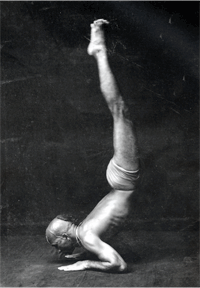 Tirumalai Krishnamacharya (1888-1989) is known as the modern father of yoga, touted with bringing hatha yoga to western culture. He began studying yoga at the age of five from his father and eventually became a yoga master, Ayurvedic physician, guru, linguist and Vedic scholar. He taught yoga for 70 some years. While teaching for the Maharaja of Mysore in the 30's, he became teacher to what became some of the most well-known names in yoga; his son, Desikachar, his brother-in-law Iyengar, his first western woman student Indra Devi and Patthabi Jois, who later developed Astanga yoga. The yoga that Krishnamacharya taught was not new yoga; it was all based on intense studies of Patangali's Yoga Sutras and other ancient texts. He felt there was only one type of yoga and that came from the Yoga Sutras. He taught that yoga was instrumental in achieving health. One misconception is that his teachings seemed to change. They did not change; they were thoughtfully altered to meet each student where their body was at that moment. He believed in teaching "what is appropriate for each individual” so taught differently to everyone. Desikachar writes he never saw his father teach the asanas to his mother but she knew them all perfectly. But Krishnamacharya restricted her practice from doing backbends, which he readily would teach to men her age. "What makes my father's yoga teachings unique is his insistence on attending to each individual and to his or her uniqueness. If we respect each person individually, it naturally means we will always start from where each person currently is. The starting point is never the teacher's needs but those of the student." Desikachar Krishnamacharya stated, "Yoga is an awareness, a type of knowing. Yoga will end in awareness. Yoga is arresting the fluctuations of the mind as said in the Yoga Sutras (of Patanjali): citta vritti nirodha. When the mind is without any movement, maybe for a quarter of an hour, or even quarter of a minute, you will realize that yoga is of the nature of infinite awareness, infinite knowing. There is no other object there.” It was very important to Krishnamacharya that the asanas be done slowly, with knowledge and with focus on the breath (pranayama). Acording to Krishnamacharya.net, he felt "that fast movements, and in turn, fast breathing will disturb the flow of prana and will result in imbalances. Slow movements with long inhale and exhale will help with proper prana flow and mental focus. " He said, "Practice without knowledge is blind. Knowledge without practice is futile." Krishnamacharya had such control over his breath and his body that one of the things he is most known for is being able to slow his breath so much that he could voluntarily stop his heartbeat for several minutes. Doctors present said they would have declared him dead. Then he would gradually bring back his breath, his pulse, his heartbeat. From Desikachar 's book Health Healing and Beyond, he writes, " "Father" , I said, " I want to learn this". "I will never teach it to you", he said. "Father," I argued, " I need to show others." "No!" he said, very forcefully. "This is not useful to society. This is only an achievement....," and here he used a term that might be translated from sanskrit as " ego trip". "I had to do this to convince the public about the power of Yoga. Now it is done. You don't have to learn this. you must only learn what is useful to the public, to society." Other quotes by Krishnamacharya and/or his students: "The rhythm of the body, the melody of the mind and the harmony of the soul create the symphony of life." Ivengar "Anybody can breathe. Therefore anyone can practice yoga." Desikachar "Because yoga is not fixed. Yoga is creation." Desikachar “Inhale, and God approaches you. Hold the inhalation, and God remains with you. Exhale, and you approach God. Hold the exhalation, and surrender to God.” Krishnamacharya "Where is the delusion when the Truth is known? Where is the disease when the Mind is clear? Where is death when the Breath is controlled? Therefore, surrender to YOGA." Krishnamacharya 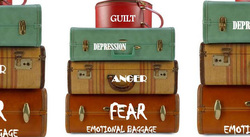 Last night I dreamt I was on vacation somewhere in a huge and very confusing hotel. There were lots of floors and hallways that merged off of other hallways. I was in my room trying to pack. My daughter's suitcase had fallen apart and I was trying to stuff all of my stuff and hers into my suitcase. I knew it was futile before I started. I had long since given up folding; I was stuffing, cramming, shoving. Time was of the essence. I had to have everything ready to go in fifteen minutes. I wasn't dressed yet. I had decided to dye my hair red like Sam's but with temporary color and it was raining outside. I knew the dye was going to be a dripping mess and I couldn't find a black shirt to wear to hide the inevitable stains. I woke up thinking this was merely an odd dream and I put it aside. I went downstairs, made a cup of coffee and was going to sit down and write my yoga theme for this morning, which had nothing to do with dreams or suitcases, when I decided to look at my emails first. One of the first to catch my eye was a Yoga Journal email with the subject line: Skip the Baggage Claim. Seriously?! Coincidence? I think not! I eagerly read the article looking for the message I was meant to see. To be honest, the only lines that stood out to me were the following: "The Indian holy man Sathya Sai Baba often tells his students, "Travel light. Arrive quickly." This applies to both spiritual and physical journeying. Pack only what you'll need." In my dream, if I had packed only the things I really needed, re-packing would not have been such a struggle. Often we pack as much as we can trying to cover the bases of those obscure things we may need while away yet usually never do. This is clearly a lesson based on Patanjali's yamas and niyamas. Greed and attachment can be tough lessons to learn. I am a recycler at heart. I love garage sales and consignment stores. I remember once taking someone who was very down on their luck to Goodwill. They had no money and needed some clothes in hopes of finding a job. When I have the time, I love going through all the stuff at Goodwill; it's really just a massive garage sale. But what I will never forget is this person's expression. I practically pulled her in the store and she just stood there, horrified. She refused to move or to look at the $5 jeans that people drop off barely worn. I walked out with her trailing behind me. Greed and ego are tough pills to swallow. She travels light now. She has no choice. She lives in a shelter. I have other friends, as well, who won't set foot in a "used clothing" store. Funny how that seems "gross" but eating and drinking out of other people's dishes everyday at restaurants does not. But I have digressed... we all hang onto different things. Traveling light spiritually and emotionally has to do with leaving your baggage behind; refusing once and for all to lug those memories, those hurts, those "failures" around behind you. Remember the hair dye stains I alluded to in recounting my dream? Our emotional hurts are like these stains. They somehow leave their mark. But that doesn't mean I have to hang onto the shirt that is covered in dye. I can choose to throw it out. I can choose to let it go. I can choose a different shirt in my closet. Dismiss the suitcase altogether and simply grab your purse or wallet and head out the door! Doesn't it always feel good to clear out stuff, to re-sell it or donate it? You feel like you have re-found space. It is the same mentally. When you let go of what you do not need, you create more space inside for good energy to fill up. It is that simple. “No one can liberate you, for no one has bound you; you hold on to the nettle of worldly pleasures and you weep for pain. The kite is pursued by the crows so long as it carries the fish in its beak, it twists and turns in the sky trying to last and it drops the fish. That moment it is free. So give up the attachment to the senses; then grief and worry can harass you no more.” - Sathya Sai Baba 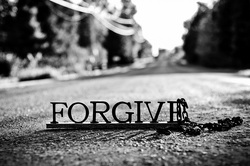 One of my yoga students presented me with the following theme idea: "I recently watched the movie "Philomena" . . . it broke my heart, made me think, and even provided some moments of laughter and joy. Philomena says to a nun who treated her horribly, sold her child, lied to her and more . . . "I forgive you". What does that mean - to forgive? My husband immediately said I would not have forgiven her! We looked up the word in the dictionary and the definition was pretty vague. I kept thinking what does it mean?? Maya Angelou said "Learn the value of forgiveness. It’s one of the greatest gifts you can give yourself, to forgive. Forgive everybody.” "I'm sure you've covered this topic many times but I do think it's something most people struggle with in large and small ways, maybe every day. Could it be as simple as making a choice to put down the burden of not forgiving and walk away? The hardest one to forgive might be ourselves." When I first read this, I had two immediate thoughts. I think most people would have watched the movie and not had a discussion about it's theme. So I felt since it obviously had had such an impact, enough to discuss it and then to sit down and take the time to send the question to me, made me feel like this was really important for me to answer and get right. Secondly, I thought, I better find out what this movie is all about! It turns out, that the movie Philomena is based on true story written in the book The Lost Child of Philomena Lee. The story takes us back to Ireland in 1951 when Philomena has a tryst with a man she meets at a fair. Upon becoming pregnant, her father sends her to live at an abbey. After giving birth, the nuns tell her she must work at the abbey for four years to pay off the expenses she has incurred. And it is about this time, four years later, when Philomena finds out the nuns allowed her son to be adopted. Philomena never tells anyone about the child but attempts, at times, to get information about the adoption. She is told the documents burned in a fire. Fifty years later, Philomena is approached by Martin Sixsmith who wants to write her story. Together, they find out the following cruel truths:
The movie isn't really the premise of the question. The question is about forgiveness. But the movie sure does make you wonder how much more can one person take and shows the amazing strength of Philomena's ability to forgive. So, I pondered this question and when I awoke this morning, my first thought was "forgiveness is for me." Could it be that simple? I tried to place myself in the shoes of Philomena; could I forgive someone who caused irreversible harm to one of my kids? And I believe I have the answer. The problem is the word forgive, itself. I don't mean the definition, which is "to stop feeling angry or resentful toward someone for an offense." The problem is with the connotations associated with the word. Forgive seems easy to say when the offense is small; I forgot to empty the dishwasher like you asked. Okay, I forgive you, do it today. But when the offense is huge, saying I forgive you feels like I am letting you off the hook, absolving you of your guilt or pain. Even though the definition clearly states to stop feeling angry...that's about me. For me to stop feeling angry. I think if we simply change the word we are using, we make this concept so much easier on ourselves to implement. Instead of I forgive you, how about I let go of you. I let go. I choose to let go of the pain and the anger and the sadness and the resentment I feel towards you. What if it is someone close to you like a family member? I let go of the pain I am feeling. I choose to love or like the parts of you that are lovable or likeable. If you do not let go of this stuff, it festers inside of you. It only hurts you. "Moving on doesn’t mean forgetting, it means you choose happiness over hurt." Do you think the nun from the story cares about the pain she caused? No! She doesn't. She is as happy as a clam inside even though she did the wrong doing. Why should the innocent, Philomena, have to live with remorse and pain and guilt? The truth is she does not have to. And she knows this as she forgives the nun at the end of the story. Now here's another point to pay close attention to. Does your letting go have to be verbalized to the other person? I think not. If the nun was remorseful and Philomena said I forgive you, the nun would probably have cried and said how sorry she was. And maybe that would make Philomena feel a little bit better inside but it would not change anything. What if the nun wasn't remorseful? She would probably scoff and say you got what you deserved (which is what she does say in the story). Wouldn't that make you feel even worse? It would be a setback. Forgiveness is about you and for you. It is not for the wrong doer. So let go. Erase the word forgive from your vocabulary if you need to but replace it with let go. The yoga student who proposed this theme asked, "Could it be as simple as making a choice to put down the burden of not forgiving and walk away?" To which I say, yes! Because what she describes is letting go. "As we grow older and wiser, we begin to realize what we need and what we need to leave behind. Sometimes walking away is a step forward."  By now, most of us are probably on the other side of all the graduations and parties we were privileged to be a part of and have already moved forward with the beginning of our busy summers. Those who graduated, youthful as they are, probably thought their graduation was all about them and their gifts and their cake. On a certain level, they are correct. But what about for the rest of us who graduated from school long ago? Graduation ceremonies are also referred to as commencement ceremonies. To commence means to begin. Therefore, we have numerous opportunities on a daily basis to graduate (leave behind unnecessary behaviors, thoughts, habits, people) and commence with new ideas and healthy thoughts and inspired habits and loving people. Sometimes moving forward makes us stressful, anticipatory. To all my yoga students, you will graduate from each yoga class, (there is no flunking, ie: failure) and you will all move on to svasana where peace awaits you. So, let go of the stress.... Arie Pencovici writes, "Graduation is only a concept. In real life every day you graduate. Graduation is a process that goes on until the last day of your life. If you can grasp that, you will make a difference." My son received a certificate as he crossed the stage at his 8th grade graduation. The certificate does not have any value. Whether he was recognized or not, he still completed 8th grade. Do not stand around waiting for life to hand you a certificate ( ie: recognition) before you are willing to move on. I am afraid you may be waiting for awhile with all the other people who are expecting applause as well. The reason in graduation ceremonies that they ask you to hold your applause until the end is because of how much longer the process would take if we waited for applause between each kid. Right? Apply that to life. So, yesterday, I made a new recipe for dinner- it was a vegetable frittata. I chopped up onion and summer squash, mushrooms and spinach and then sauteed them before I mixed them with the eggs and coconut milk and sent it into the oven. I did not await applause between each step; it wouldn't have come or been expected and no one else was around! I knew my fritatta had graduated when the timer went off so I took it out and placed it on the stove. I did not applaud it nor it me. The recipe was from my new healthy eating cookbook and I couldn't wait to try it. I slid the bite off my fork and waited for the flavors to dance upon my tastebuds. There was no dancing; the fritatta sucked. That may be a little strong; it was bland. No one liked it. Which was doubly great because I had thought ahead to make two so I could freeze one. There was no applause for my efforts. I stood up and commenced the next stage of my day by cleaning up all the dishes that had helped me make this pitiful dish. My analogy is a little crazy; we don't really expect to hear a clapping soundtrack after everything we accomplish. Maybe we do for the big ones but not the trivial. So why do we get stuck waiting for applause to happen before we move on? Dr. Seuss writes, "You have brains in your head. You have feet in your shoes. You can steer yourself in any direction you choose. You're on your own. And you know what you know. You are the guy who will decide where to go." So get excited about your day. Each day a graduation, a completion of your efforts. Each morning a commencement to what lays ahead. And the exciting part is you get to decide that! You decide if you will gift yourself time for your yoga practice, you decide if you are going to learn to make pottery, you decide if you will lay out in the sun and be present, you decide if you are ready to cut loose the people who deplete you of energy, you decide if you will make a better fritatta than mine (not a problem!), you decide everything! That's exciting!! It also points directly at who is to blame if you didn't like how your day went. And that mirrored image you may be pointing to has the power to start over without even waiting for tomorrow. That's exciting, too. 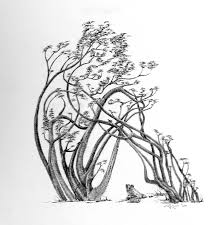 One of my yoga students asked to me offer a theme on wistfulness and heartbreak. Treading carefully, I offer you the following... I would define wistfulness as a deep longing for something you had once but can no longer have. When wistfulness visits you, I caution you to not be sucked in by its pull. This type of longing has roots in your past. Should you choose to rehash what you had and rehash it again, not only are you creating suffering for yourself but you have removed yourself from the very "presentness" of life. Pining away for what can never be is such an exhaustive waste of your energy! When you find yourself in this state, try a simple mantra-like reminder like, "Stay in the present, I am in the present." Heartbreak and loss are similar "high alert zones" with a twist. When you are wistful, you consciously or unconsciously decide to be in a state of longing. Heartbreak and loss are inevitable experiences we will all have on earth and they can feel devastating. The reason I started off by saying I was going to tread lightly on this subject is because no one can put an amount or definition to what another experiences from loss. There will be stages of grief to tread through but it is in how you ultimately choose to react to your situation that will set you apart in your return to your new "normalcy." In Chapter 2 of the Bhagadva Gita, Arjuna says to Krishna, "My soul is oppressed by a sense of frustration. My mind is unable to determine what is right. I am requesting you to tell me definitely what is for my good. I am your pupil. Teach me. I have surrendered myself to you." Sometimes our questions and appeals to our Higher Source do not seem to be answered right away. Krishna's response to Arjuna comes some 16 chapters later when he explains the theory of Bhakti Yoga which is a path of devotion, love and surrender. Krishna states that non-believers cannot be devotees to Bhakti Yoga. However, decipher the word God as it meets your beliefs: Higher power, light, deity (by whatever name). Bhakti yoga is about pure love. If you devote yourself to sending out love, sending out love, sending out love, especially in your time of need, the love you send out is coming right back to you! Unfortunately, when most of us are in the throes of pain, that is when we neglect our faith and our yoga practice and we shut down. Right? Why bother sending out love when life is too sad? Except that this is when it is most important to do so. Kirtan, which is call and response singing or chanting, originated in the Mogul era as a way to offer praise (bhakti) to Krishna (God). Musician Jai Uttal says "singing—a mantra, a hymn, or the name of your spiritual guide—is another way to treat an aching heart. You can sing kirtan sweetly, or sing them fiercely with angst, or sing them with yearning or whatever emotions are arising in you. If you get bored, keep on singing. Sing until the singing itself becomes part of your molecules, and your heart flows into the ocean of divine love." If you are interested in kirtan, check out C.C. White or Sean Johnson and the Wild Lotus Band. I like both of them. But the best thing about kirtan is you don't have to be a good singer; it's about the love you express through your voice and love does not judge the pitch and tone of your art. Since Bhakti yoga is about love and faith, find ways to express this that are relevant to you. Take a walk outside and express love and gratitude for everything you see; the tress, the birds, the weeds, the bugs, the dirt... Maybe you like to write. Buy a special journal and write until you cannot write any more. Write until your ego finishes what it has to say and your inner voice is able to emerge. Maybe you like to run. Add the word love each time your foot hits the ground. Just do not withdraw into a shell. Shells are hard, impenetrable. You need to be open and receptive to receiving love and light. Great poses for dealing with heartache are heart opening poses like Camel and Bridge and poses of heartful surrender like Child's Pose. The following two poems are by Hafiz and Kabir, respectively, two devotional Bhakti poets. The Subject tonight is Love- Hafiz The subject tonight is Love And for tomorrow night as well, As a matter of fact I know of no better topic For us to discuss Until we all Die! The bhakti path winds in a delicate way. On this path there is no asking and no not asking. The ego simply disappears the moment you touch him. The joy of looking for him is so immense that you just dive in, and coast around like a fish in the water. If anyone needs a head, the lover leaps up to offer his. -Kabir |
Archives
March 2024
|
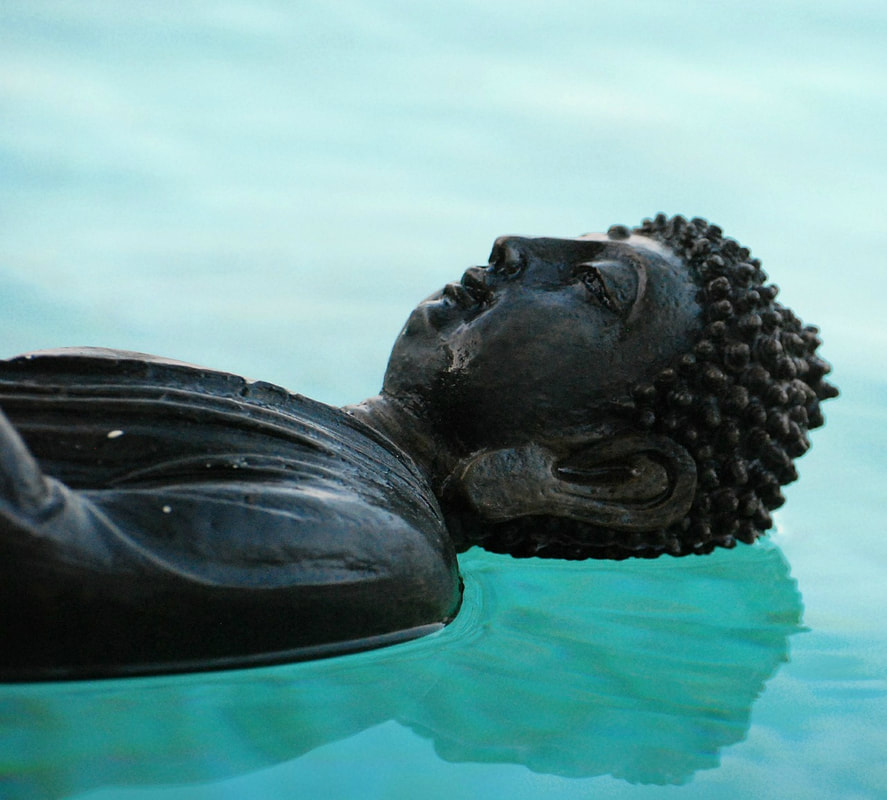
 RSS Feed
RSS Feed